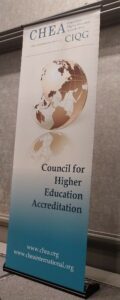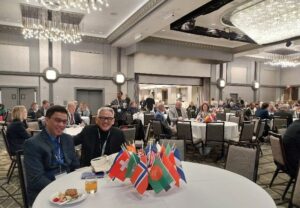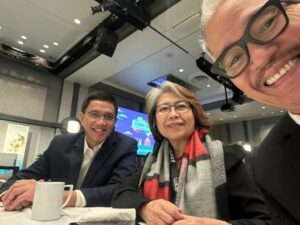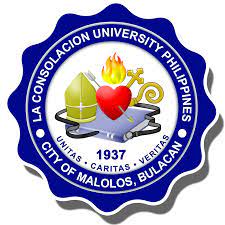PAASCU Attends 2024 CHEA/CIQG Annual Conference
PAASCU Attends 2024 CHEA/CIQG Annual Conference
By Marlu Vilches
In wintry Washington, D.C., the Council for Higher Education Accreditation (CHEA) and its International Quality Group (CIQG) jointly held CHEA’s annual conference on the theme “Quality Assurance Matters.” Held in The Capital Hilton from 29 January to 1 February, it was joined by over 300 participants mostly from the United States of America, but a significant number came from Europe and Asia. The participants were leaders of universities and schools, governance bodies, and accrediting agencies. 
PAASCU was represented by Bro. Edmundo “Dodo” Fernandez, FSC, President of the PAASCU Board; Mr. Ricardo “Ric” Palo, PAASCU Executive Director; and Dr. Maria Luz “Marlu” C. Vilches, PAASCU Board Member.
The presentations covered a broad range of topics whose contexts were largely American but whose application could be extrapolated into other contexts since quality assurance in itself has a universal relevance. In the education sector, quality assurance is a culture that commits to continuous improvement in student learning outcomes, tied to the assessment of goals. What the conference emphasized over and over again was for us not to lose track of the bottom line – that is, student success. The impact of the COVID-19 pandemic on learning loss was acknowledged – a real challenge for teachers now to help students recover from that loss and how to harness online learning as a form of support for students. A strong support system was recognized as necessary for both teachers and students to navigate this difficult terrain. Hence, quality assurance in the governance system, too – with a good feedback mechanism for the institution – is a must for developing robust governance. What was noted in one parallel session was the attrition in Higher Education leadership and how this creates a negative impact on quality assurance. Perhaps this phenomenon is not felt much in the Philippines but what this attrition called attention to me was the necessity for leadership training for leaders of HEIs. I wonder how this can be done in the Philippine setting in a big way. I think it’s an important undertaking given the increasing complexity of leadership roles in any institution. Since student success is also measured in the way they live their lives fruitfully and meaningfully beyond the school/university setting, quality assurance is also a commitment of the institution to engage with external institutions where students eventually land jobs.
The plenaries – done in an interactive panel conversation style – were excellent exchanges of ideas that revolved around preparing higher education institutions for escalating societal and technological advancements. For example, what are the moral and economic imperatives that accompany the mandate of diversity, equity, and inclusion? While this might be less of an issue in Philippine HEIs, in the US, compliance with that mandate is a determinant of how much funding some institutions can have access to. What came up as a real issue for us in the discussion was the drastic development of AI innovations and their implications for classroom teaching and learning. The general tenor of the discussions was toward helping institutions use AI to their advantage in aid of learning but not as a substitute for learning.
Other interesting topics had to do with how politics can be disruptive of accreditation when political figures interfere with the processes of accreditation that do not conform to their agenda. Corollary to this, as discussed, was the politics of accreditation itself when lawsuits are impacting accreditation necessitating institutions to change accreditors. These realities are very US-centric and luckily far from our Philippine context and we hope that we don’t get there.
The conference was vibrant. People were thinking through issues seriously. It was good to be there to be able to see better where we are as PAASCU in view of a wider context. I hope others in PAASCU can also be part of similar conversations.
It was refreshing to see CHEA, an organization whose main preoccupation is accreditation, at the forefront of generating discussions of topics that impact HEI’s core values of teaching and learning, governance, etc. There is value for an accrediting body to be in keeping with what matters in educational circles and what influences thinking and ways of proceeding in these arenas. In doing so, accrediting bodies are not distant from the HEIs; rather, they are in tandem with growth and development. I also noted in the discussions that accreditation in the US has drastically moved away from being prescriptive with rigid standards. The more welcome trend is that which considers the context of the institution, making the accrediting standards a great help for the institution in discovering if its programs and processes fit its mission. This way of doing things empowers the institution toward internal quality assurance processes.
That conference made Bro Dodo, Ric, and I feel that PAASCU is moving in the right direction of growth – slowly. Revising our accreditation instrument was a good move. I think the next step would be a retraining of accreditors in the use of the new instrument. It would also be good for PAASCU to go to the schools and engage the leadership of schools in conversation regarding the new mindset about accreditation that PAASCU is trying to advocate and implement.
PAASCU has a long way to go. But we can start small with big ripple effects.





